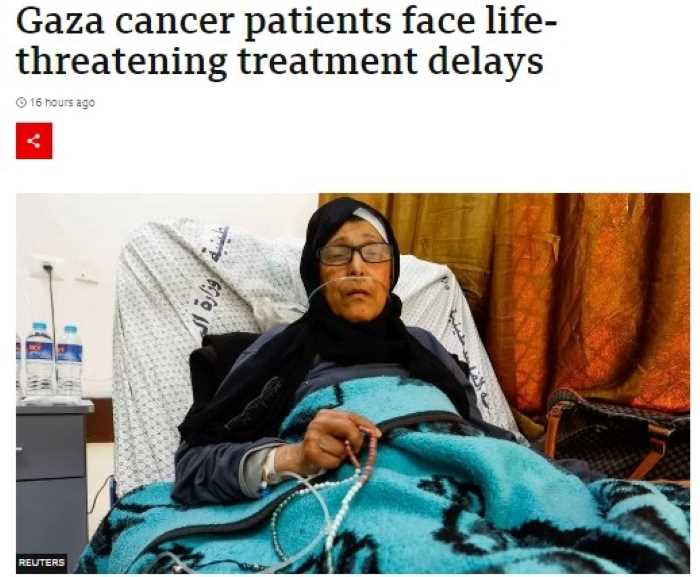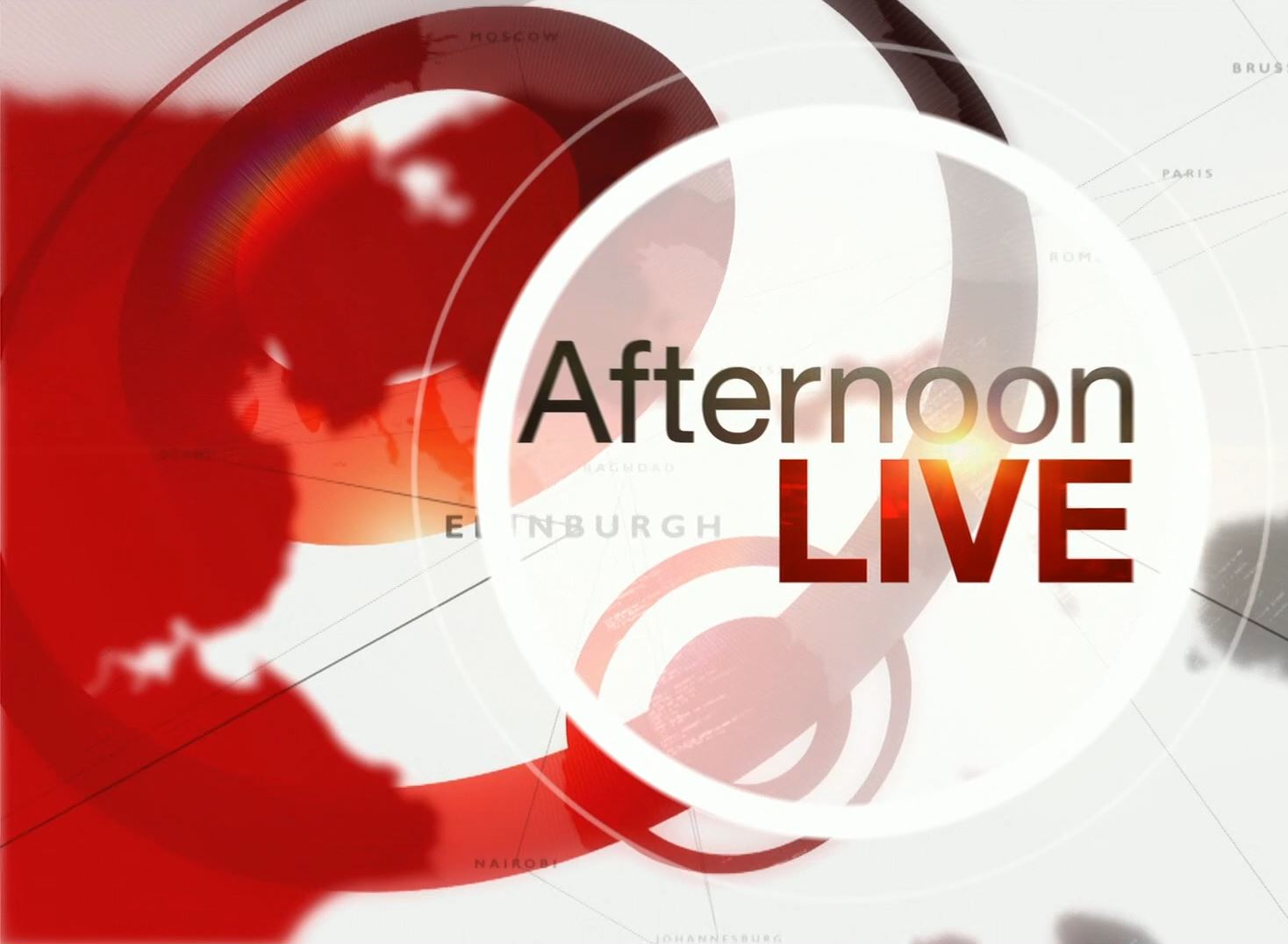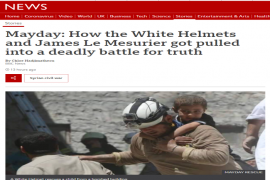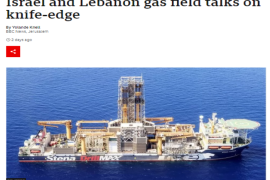On May 12th the BBC News website published a report that was originally credited to Raffi Berg and headlined ‘Gaza rockets near Jerusalem amid fresh attacks’. As the day went on that report underwent amendment and a later version – credited to David Gritten and Raffi Berg and headlined ‘Gaza: Sixth militant commander killed in Israeli air strike’ – included the following final three paragraphs: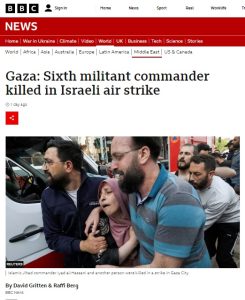
“Meanwhile, a British surgeon stranded in Gaza has told the BBC that more than 140 “desperately sick” patients there, most of whom have cancer, are being denied urgently-needed treatment while the crossing to Israel remains shut for a fourth day.
“The doctors I work with here have got multiple examples of people who are in desperate need of cancer treatment,” Professor Nick Maynard said.
“These treatments are undoubtedly being delayed and potentially leading to deaths because of the delays now,” he added.”
A link to that report was promoted in a Tweet put out by the BBC Jerusalem bureau’s Tom Bateman on the evening of May 12th:
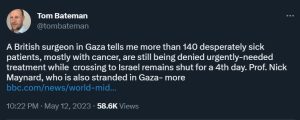
On the evening of May 13th the BBC promoted another BBC News website report on Twitter, telling members of the public that cancer patients are unable to leave the Gaza Strip for treatment because “Israel keeps all crossings shut”.
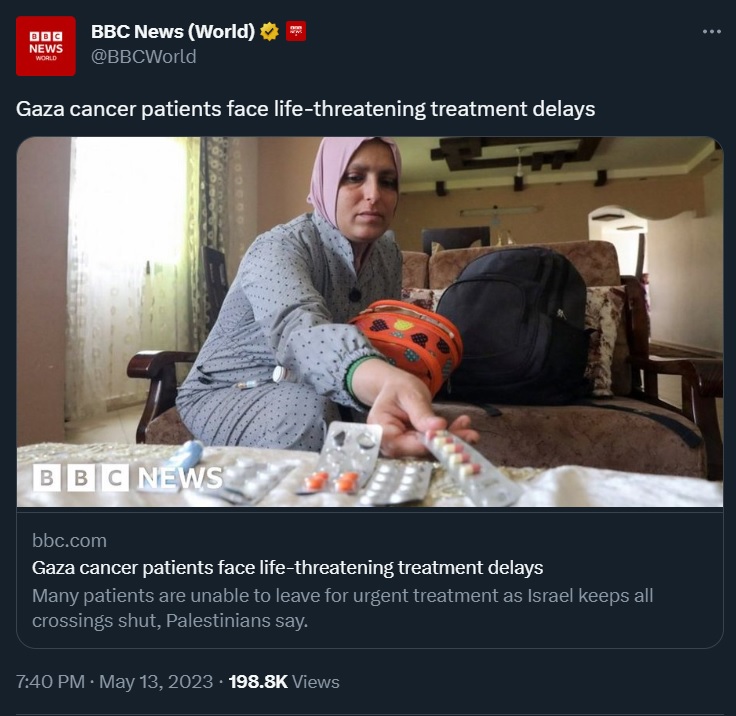
The article promoted in that tweet is headlined ‘Gaza cancer patients face life-threatening treatment delays’ and is credited to “Yolande Knell in Jerusalem & Rushdi Abualouf in Gaza Strip”. At the bottom of the report “Additional reporting by BBC’s Tom Bateman” is noted.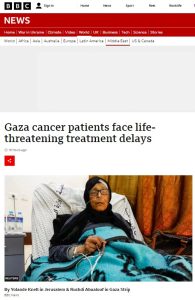
That report also quotes the same British doctor who was apparently not perturbed by the fact that terrorists in the Gaza Strip had fired over a hundred rockets and mortars at Israeli communities just days before he travelled to the Gaza Strip and who had been there for two days when Operation Shield and Arrow began.
“A British surgeon who is among an estimated 140 humanitarian workers currently stranded in Gaza says cancer patients are facing potentially life-threatening delays.
Prof Nick Maynard, a consultant surgeon at Oxford University Hospitals, arrived in Gaza City last week as part of an aid programme teaching advanced cancer surgery to Palestinian doctors.
“The doctors I work with here have got multiple examples of people who are in desperate need of cancer treatment,” Prof Maynard told the BBC.
“These treatments are undoubtedly being delayed and potentially leading to deaths because of the delays now,” he added.
Prof Maynard said he was one of about a dozen non-resident British nationals stuck in Gaza.”
The BBC was not the only media outlet with which Prof Maynard spoke. A report by the PA News agency on the same topic appeared for example in The National and the Cambs Times. However that report included information which was not provided to BBC audiences:
“Mr Maynard, 61, who is working with Medical Aid for Palestine [sic], said he has seen “rockets” and destruction since the fighting broke out and the doctors have been told they cannot leave their city centre hotel.”
It would of course have been helpful to BBC audiences to know that the British doctor quoted in two BBC reports is associated with the NGO ‘Medical Aid for Palestinians’ (MAP) which, in addition to its medical work engages in anti-Israel political activity, including on the topic of the counter-terrorism measures in the form of restrictions on entry into Israel from the Gaza Strip.
In fact, on the day that Tom Bateman spoke with the British doctor and the first of these two BBC reports was published, MAP was already running a campaign of its own concerning the closure of crossings as well as retweeting a similar campaign run by another political NGO based on ‘updates’ from the Hamas-run ministry of health.
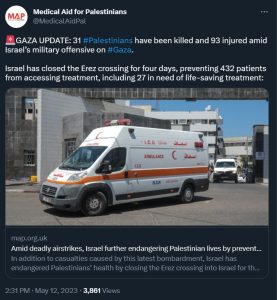
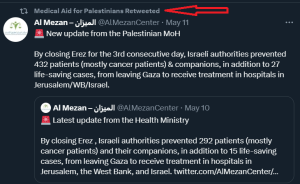
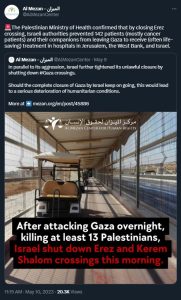
Near the beginning of their report Knell and Abualouf tell readers that:
“Israel controls two crossings with Gaza – used for people and goods – which have been closed since the start of its military operation on Tuesday.”
Only in paragraph 29 do readers find the following, together with an embedded Tweet in Hebrew, even though an English language version was available. [emphasis added]
“Israel’s military-run authority that controls entry into Gaza said its crossings had been under the constant threat of rocket fire and remained shut this week.
The Israeli defence ministry said on Saturday that Palestinian Islamic Jihad (PIJ) militants had fired dozens of mortars at Erez and Kerem Shalom since Tuesday.
It also posted what it said was security camera footage showing a blast caused by a mortar fired at Erez.”
Readers are then told that:
“But the first day of Israel’s airstrikes witnessed no Palestinian fire and there have also been several lulls in the fighting.”
Apparently Yolande Knell and Rushdi Abualouf are of the opinion that the Israeli authorities should have gambled with the lives of residents of the Gaza Strip (and Israeli staff) by opening the Erez crossing during entirely unpredictable “lulls” in rocket and mortar fire by terrorist organisations.
Nowhere in this report are BBC audiences told that the Gaza Strip also has a border with Egypt. The sole vague reference to that comes in the following paragraph:
“In past conflicts, there would have been serious food shortages after several days of closure. However, recently Egypt has eased its tight restrictions on the Palestinian territory, which means food and other goods are continuing to enter.”
That omission is particularly relevant given the report’s promotion of claims of a worsening humanitarian situation due to the closure of the commercial crossing Kerem Shalom.
The topic of shortages of medical supplies is one which the BBC – including Yolande Knell – has repeatedly misrepresented for years and this report is no exception:
“Gaza’s hospitals face severe shortages of medical equipment and medicines largely due to the blockade, but also because of internal Palestinian political divisions.” [emphasis added]
The topic of medical travel permits is also frequently portrayed in a one-sided manner by the BBC, with audiences denied information concerning abuses of such permits. In this report too, Knell and Abualouf fail to explain why such travel permits are necessary.
“Many cancer patients need to leave for medical treatment; they have to apply for Israeli permits to exit via the Erez crossing. Most of those who get these are transferred to Augusta Victoria Hospital in occupied East Jerusalem. […]
When the current hostilities end, patients and relatives accompanying them will have to apply for new Israeli permits to leave Gaza.
“When the checkpoints are open, there will be another process for permits. More time will be taken to arrange their exit from Gaza to the hospital and that will add to the delay in their treatment that they have suffered from in the past week,” Dr Fadi said.”
The BBC’s report also relates to another topic that has been frequently misrepresented in the past: the Gaza power plant.
“Operators of the sole power plant in the impoverished strip – which relies on Israeli fuel imports – say it will be forced to close in three days.
A spokesman told the BBC this would “lead to an exacerbation of the humanitarian problems”. The plant supplies about half of the electricity in the territory, where some 2.3 million Palestinians live. […]
Already Gaza’s power plant is reducing the amount of electricity it generates, to try to save its fuel reserves. If it shuts down, this will have an impact on many different services.
“Preventing the entry of fuel shipments threatens it with a complete stop and will prevent the Gaza Electricity Distribution Company from supplying vital facilities such as hospitals, waste pumps and treatment plants, potable water wells and desalination plants,” said Muhammad Thabet, a spokesman for the company.”
Readers are not told why fuel shipments have not been brought in via the crossing to Egypt or that Israel continued to supply the other half of the electricity used in the Gaza Strip even as terrorists bombarded its civilians with over a thousand rockets and mortars.
While there is no doubt that residents of the Gaza Strip suffer when the two crossings into Israel are closed, this report by Knell and Abualouf places the responsibility for that exclusively on Israel rather than on the terrorist organisations that once again forced their closure with rocket and mortar attacks. Indeed, the sole mention of the Palestinian Islamic Jihad, which initiated this latest round of conflict, comes in the quote from Israel’s ministry of defence.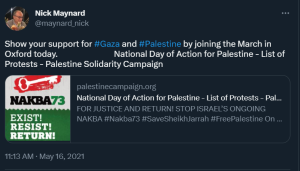
The repeated promotion of messaging from an activist who is also a doctor associated with a political NGO engaged in campaigning on a topic identical to the subject matter of Knell and Abualouf’s report without disclosure of his affiliation with ‘Medical Aid for Palestinians’ clearly does not meet supposed BBC standards of impartiality.
Related Articles:
BBC NEWS AVOIDS RELEVANT PALESTINIAN ISLAMIC JIHAD BACKGROUND
BBC REPORTING ON PIJ CONTINUES TO LEAVE READERS UNDERINFORMED

